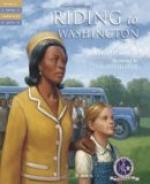“I knew a poor lass that allus
were tired,
Shoo lived in a house wheer help
wasn’t hired.
Her last words on earth were, ‘Dear
friends, I am goin’
Wheer weshin’ ain’t
doon, nor sweepin’, nor sewin’,
Don’t weep for me now, don’t
weep for me niver,
I’m boun’ to do nowt
for iver an’ iver.’”
“Ay, lass,” Job replied, “that’s reight enif for thee. Breedin’ barns taks it out o’ a woman. But it’ll noan suit me so weel.”
I did my best to reason with Job and to enlarge his conception of the life to come and of the progress of the soul after death, but I made little impression on his mind. A heaven without forges, fox-hunting and hen-coops offered him no possible attraction.
“What thou says may be true,” he would answer, “but it’ll noan be Job Hesketh that’s sittin’ theer. It’ll be somebody else o’ t’ same name.”
Thus did he fall back upon his ever-besetting fear of loss of personality in the life hereafter, and, like his Biblical namesake, he refused to be comforted.
The agony which Job Hesketh was enduring did not make him listless. On the contrary, it seemed to give him new energy. It is true that the old pleasure had gone out of his work and play, but to him work and play meant life, and to life he clung with the energy of one who lived in constant fear lest it should be suddenly snatched from him. It was January when Abe Verity had met with his fatal accident, and all through the next six months Job toiled like a galley-slave.
It was the practice of the Heskeths to spend the first ten days of August at the seaside. It was their annual holiday, long talked of and long prepared, and it was invariably spent at Bridlington. There Job could indulge to the full in his favourite holiday pastime of swimming, and there he was in close touch with the undulating wold country where his boyhood had been spent. He could renew old acquaintances, lend a hand to the farmers, or wander at will along the chalk beds of the gipsies or dry water-courses which wind their way from the hills to the sea. Years ago he and his wife had given a trial to Scarborough, Blackpool and Morecambe as seaside resorts, but they felt like foreigners there and had come back to Bridlington as to an old home.
“There’s nowt like Bridlington sands,” he would say, in self-defence. “I’m noan sayin’ but what there’s a better colour i’ t’ watter at Blackpool, but there’s ower mich wind on’ t sea. Sea-watter gits into your mouth when you’re swimmin’ and then you’ve to blow like a grampus. Scarborough’s ower classy for t’ likes o’ Mary an’ me; it’s all reight for bettermy-bodies that likes to dizen theirselves out an’ sook cigars on church parade. But me an’ t’ owd lass allus go to Bridlington. It’s homely, is Bridlington, an’ you’re not runnin’ up ivery minute agean foreign counts an’ countesses that ought to bide wheer they belang, an’ keep theirsens to theirsens.”




